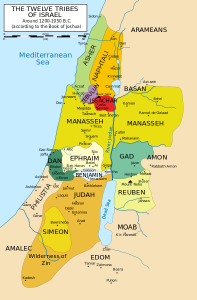If this is your first viewing, please see my Introduction before reading this.
14-16 March. Joshua chapters 12 – 21
I have taken three days readings together here, since it takes a full ten chapters (admittedly some of them quite short) to recount the division of the land between the tribes. And I will admit to having speed-read much of this, as much of it reads like the gazetteer at the back of a road atlas. What I did find helpful was a map that I found on Wikimedia Commons showing the areas given to each tribe:

This file is licensed under the Creative Commons Attribution-Share Alike 3.0 Unported license.
Just one particular point occurred to me: as well as the tribal areas and a list of their towns and villages, Joshua makes provision for some towns and their pasture lands to be occupied by the priestly Levites who had no territory of their own as such. The Levites therefore were spread out across all the tribal areas, and their cities included Kedesh, Hebron, Shechem, Golan, Bezer and Ramoth-in-Gilead, which were the six cities of refuge (for those accused of capital offences, to protect them from vengeance until proper justice could be done).
The Levites, then, had no inheritance, but received the tithes of the people. They also had the privilege of being spread out in the community, and with a particular presence where people came for refuge. There are several resonances there with the tradition of the parish priest in Catholic or Anglican tradition.
The priest (at least in the Catholic church) is expected to be celibate, and therefore without descendants. He (or she, in the case of the Anglican church in many countries) is expected to minister out in the community and not only to his or her own ‘flock’ in church. Priests are expected to move around several times during their training and subsequent ministry, and become familiar with all sections of society. And they are to have a particular concern for the vulnerable: the secrecy of the confessional is traditionally sacrosanct (although in recent times a secular concern for safeguarding has obliged a priest to disclose pastoral secrets in certain circumstances). The priest’s reward is not financial, and his or her lie will be long and demanding. But their satisfaction will be in seeing lives transformed and people meeting with God through their sacramental and pastoral ministry. The main difference between then and now is that priesthood is seen as an individual calling rather than a tribal duty.